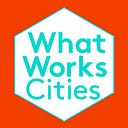How Cities Can Connect With Residents in 2023
A Letter From WWC Managing Director Rochelle Haynes
Dear City Leaders,
Happy New Year! I hope that your 2023 is off to a positive start. I’m energized and looking forward to supporting your efforts to improve residents’ lives.
Throughout my career, I’ve worked in government, nonprofit and philanthropy to spearhead anti-poverty and economic mobility programs that expand access to opportunity in vulnerable communities. Since joining What Works Cities, I’ve had the privilege of speaking with leaders from across North, Central and South America. Many of you have told me about the need to prioritize economic mobility amid an ever-widening wealth gap.
The systems and structures you built during the COVID-19 pandemic provided services that helped keep people healthy, in their homes, and employed. The pandemic also laid bare deep inequities that plague access to health care, housing, education and employment. Many cities realized that the way they used data didn’t unearth these inequities which left gaps in policy and investments — meaning entire neighborhoods and communities have been left behind. Today that mindset is shifting. Local leaders in big and small cities have made data-driven and equitable investments in programs that address the root causes of systemic inequality.
In 2023, successful cities will connect residents with the community, resources and opportunity necessary for economic empowerment and mobility.
To make these connections successfully, cities must rely on data. In our hyper-polarized world, only a few tools cut through the noise. And, data is one of them. Data moves the conversation away from political parties and individual ideologies and shifts it to the facts. These facts guide investments that lead to positive outcomes. We are proud to work with dozens of cities that set the bar for using data to create positive outcomes for residents.
It is not easy to build a government that leads with data. But I believe that city leaders, like you, are not only up for the challenge, but in a unique position to harness data to drive economic mobility by being a primary connector to opportunities that will improve the lives of your residents. The foundation of economic mobility is built on services that local governments provide: access to high-quality education from birth through adulthood, affordable housing and good jobs. When I think about who can connect parents with childcare options, students to broadband internet, and job seekers to workforce development programs and local employers, I think of you.
As a first step, city leaders can connect with communities and build trust by showing residents that their policies put the community — the whole community — first. Using data to make well-informed decisions means ensuring data collection processes are equitable, ethical and transparent.
In Gold-Certified Washington, D.C., they are living this philosophy with the City’s first-ever Racial Equity Action Plan. The plan was built on community input and seeks to close racial equity gaps and measure progress toward a more equitable city by tracking indicators in seven categories: education, health, economic opportunity, safety, neighborhood life, civic engagement and housing. Meanwhile, Silver-Certified Charlotte, NC, has launched a public-private equity partnership and Certified cities like San Antonio, Louisville and Austin have rolled out equity atlases to tackle disparities across indicators like race and income.
There is also an urgent need to connect communities to resources like transportation and broadband internet. Reliable internet is critical for students to learn, workers to thrive, and vulnerable communities to access critical government services. In Silver-Certified Longmont, Colorado, data collected through its Longmont City Assistance and Rebate System (CAReS) program is used to identify broadband needs and expand wifi access.
Finally, opportunity is at the heart of economic mobility. Cities can create connections to the opportunities needed to increase economic mobility. For example, Tulsa, Oklahoma built upon a nationally recognized, evidence-based workforce program to provide life skills workshops, GED attainment, career exploration, and wraparound services in addition to training and job placement for young adults. As part of the WWC Economic Mobility Initiative, the program reported a 94% satisfaction rate among graduates and a nearly three-fold increase in participation, program completion and job placement.
Building and maintaining connections to community, resources and opportunity is a city’s unique power. It is your superpower! You are best positioned to build back trust in our institutions and serve as a driving force to improve economic mobility. This power inspires What Works Cities to build the future of data-driven government through our Certification program. I truly believe your cities will take on an even bigger role in delivering positive and equitable outcomes for your residents for years to come.
This year, I look forward to being your champion and partner in this work.
Sincerely,
What Works Cities Managing Director
